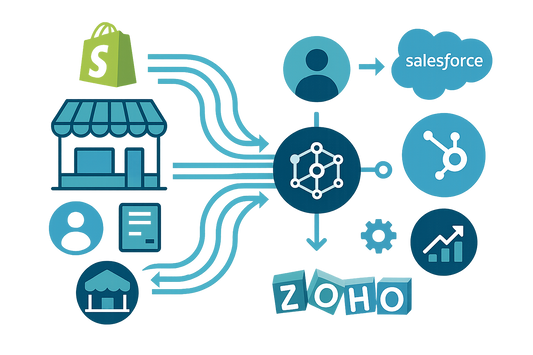Using Shopify Flow to Automate Your E-Commerce Operations
Share
In the fast-paced world of e-commerce, efficiency is key to staying ahead of the competition. As online businesses grow, managing inventory becomes increasingly complex, often requiring significant time and resources. However, Shopify Flow offers a solution that can transform how you handle inventory management, allowing you to focus on what truly matters—growing your business. By automating repetitive tasks and streamlining operations, Shopify Flow empowers e-commerce entrepreneurs to optimize their inventory processes with ease.
To begin with, Shopify Flow is an automation platform designed specifically for Shopify users. It enables merchants to create custom workflows that automate various aspects of their business operations, including inventory management. This powerful tool allows you to set up triggers, conditions, and actions that work together to perform tasks automatically. For instance, when inventory levels fall below a certain threshold, Shopify Flow can automatically reorder products, ensuring that you never run out of stock. This not only saves time but also prevents potential sales losses due to stockouts.
Moreover, Shopify Flow can help you maintain accurate inventory records by automating the process of updating stock levels. When a customer places an order, the platform can automatically adjust the inventory count, reflecting the change in real-time. This eliminates the need for manual updates, reducing the risk of human error and ensuring that your inventory data is always up-to-date. As a result, you can make informed decisions about purchasing and restocking, ultimately leading to better inventory management.
In addition to automating stock level adjustments, Shopify Flow can also streamline the process of managing product variants. For businesses that offer multiple variations of a product, such as different sizes or colors, keeping track of each variant's inventory can be challenging. With Shopify Flow, you can set up workflows that automatically update inventory levels for each variant, ensuring that your records are accurate and consistent across the board. This level of automation not only simplifies inventory management but also enhances the overall customer experience by providing accurate product availability information.
Furthermore, Shopify Flow can be integrated with other apps and services, allowing you to create a seamless inventory management system. For example, you can connect Shopify Flow with your preferred shipping and fulfillment services to automate the process of updating inventory levels once an order is shipped. This integration ensures that your inventory data is always synchronized, providing you with a comprehensive view of your stock levels at any given time. By leveraging these integrations, you can create a more efficient and cohesive inventory management system that supports your business's growth.
As you explore the possibilities of Shopify Flow, it's important to remember that automation is not just about saving time—it's about unlocking potential. By automating routine tasks, you free up valuable resources that can be redirected towards strategic initiatives, such as expanding your product line or enhancing your marketing efforts. In this way, Shopify Flow serves as a catalyst for growth, enabling you to focus on what truly matters: delivering exceptional value to your customers and driving your business forward.
In conclusion, Shopify Flow offers a powerful solution for streamlining inventory management in the e-commerce space. By automating key processes and integrating with other services, it empowers businesses to maintain accurate inventory records, prevent stockouts, and enhance the overall customer experience. As you harness the power of automation, you'll find that Shopify Flow not only simplifies your operations but also inspires new possibilities for growth and success in the ever-evolving world of e-commerce.
Enhancing Customer Experience through Automated Workflows
In the ever-evolving world of e-commerce, providing an exceptional customer experience is paramount to standing out in a crowded marketplace. As businesses strive to meet and exceed customer expectations, automation has emerged as a powerful tool to streamline operations and enhance the overall shopping experience. Shopify Flow, a robust automation platform, offers e-commerce businesses the opportunity to automate various workflows, thereby freeing up valuable time and resources to focus on what truly matters: the customer.
To begin with, Shopify Flow allows businesses to automate repetitive tasks that, while necessary, can be time-consuming and prone to human error. By automating these tasks, businesses can ensure consistency and accuracy, which are crucial for maintaining a high level of customer satisfaction. For instance, inventory management can be automated to update stock levels in real-time, reducing the risk of overselling and disappointing customers. This seamless integration not only enhances operational efficiency but also builds trust with customers, who can rely on accurate product availability information.
Moreover, Shopify Flow enables businesses to personalize the customer journey, a key factor in enhancing customer experience. Through automated workflows, businesses can segment their customer base and tailor marketing efforts to specific groups. For example, by analyzing purchase history and browsing behavior, businesses can create targeted email campaigns that resonate with individual customers. This level of personalization fosters a deeper connection with customers, making them feel valued and understood, which in turn encourages brand loyalty and repeat purchases.
In addition to personalization, Shopify Flow can significantly improve customer service, a critical component of the overall customer experience. Automated workflows can be set up to trigger alerts for customer service teams when certain conditions are met, such as a negative review or a high-value order. This proactive approach allows businesses to address potential issues swiftly, demonstrating a commitment to customer satisfaction. Furthermore, by automating routine customer service inquiries, such as order status updates or return requests, businesses can provide timely responses, reducing wait times and enhancing the customer experience.
Transitioning from customer service to order fulfillment, Shopify Flow also plays a vital role in streamlining this crucial aspect of e-commerce operations. Automated workflows can be designed to manage order processing, from the moment a customer places an order to the final delivery. By automating tasks such as order confirmation emails, shipping notifications, and tracking updates, businesses can ensure a smooth and transparent process for customers. This not only enhances the customer experience by keeping them informed every step of the way but also reduces the workload on staff, allowing them to focus on more strategic initiatives.
Furthermore, Shopify Flow's ability to integrate with other apps and platforms extends its automation capabilities, providing businesses with a comprehensive solution to optimize their operations. By connecting with third-party applications, businesses can automate even more aspects of their e-commerce operations, from accounting and reporting to marketing and customer relationship management. This interconnectedness ensures that all facets of the business work in harmony, ultimately leading to a more cohesive and satisfying customer experience.
In conclusion, Shopify Flow offers e-commerce businesses a powerful tool to automate workflows, thereby enhancing the customer experience. By streamlining operations, personalizing interactions, improving customer service, and optimizing order fulfillment, businesses can focus on building meaningful relationships with their customers. As the e-commerce landscape continues to evolve, embracing automation through Shopify Flow can inspire businesses to reach new heights in delivering exceptional customer experiences.
Boosting Sales with Personalized Marketing Automation
In the ever-evolving world of e-commerce, businesses are constantly seeking innovative ways to enhance their operations and boost sales. One powerful tool that has emerged in recent years is Shopify Flow, a platform designed to automate various aspects of e-commerce operations. By leveraging Shopify Flow, businesses can streamline their processes, allowing them to focus more on personalized marketing strategies that resonate with their customers. This, in turn, can lead to increased sales and a more loyal customer base.
To begin with, Shopify Flow offers a range of automation capabilities that can significantly reduce the time and effort required to manage an online store. For instance, it allows businesses to automate repetitive tasks such as inventory management, order processing, and customer segmentation. By automating these tasks, businesses can ensure that their operations run smoothly and efficiently, freeing up valuable time and resources that can be redirected towards more strategic initiatives. This is where personalized marketing comes into play.
Personalized marketing is a strategy that involves tailoring marketing messages and offers to individual customers based on their preferences, behaviors, and purchase history. With Shopify Flow, businesses can easily implement personalized marketing campaigns by automating the process of collecting and analyzing customer data. This data can then be used to create targeted marketing messages that are more likely to resonate with customers and drive sales. For example, businesses can set up automated workflows that send personalized emails to customers who have abandoned their shopping carts, offering them a discount or incentive to complete their purchase.
Moreover, Shopify Flow enables businesses to segment their customer base more effectively. By using automation to categorize customers based on their buying habits, businesses can create more targeted marketing campaigns that speak directly to the needs and interests of different customer segments. This level of personalization can lead to higher engagement rates, as customers are more likely to respond positively to marketing messages that are relevant to them. As a result, businesses can see a significant boost in sales and customer loyalty.
In addition to enhancing personalized marketing efforts, Shopify Flow also provides businesses with valuable insights into their operations. By automating data collection and analysis, businesses can gain a deeper understanding of their customers and their buying behaviors. This information can be used to refine marketing strategies, optimize product offerings, and improve the overall customer experience. With these insights, businesses can make more informed decisions that drive growth and profitability.
Furthermore, the integration of Shopify Flow with other tools and platforms can amplify its impact on personalized marketing. By connecting Shopify Flow with email marketing platforms, social media channels, and customer relationship management systems, businesses can create a seamless and cohesive marketing strategy that reaches customers across multiple touchpoints. This integrated approach ensures that customers receive consistent and personalized messages, regardless of how they interact with the brand.
In conclusion, Shopify Flow is a powerful tool that can transform the way businesses approach e-commerce operations and personalized marketing. By automating routine tasks and leveraging customer data, businesses can create more targeted and effective marketing campaigns that drive sales and foster customer loyalty. As the e-commerce landscape continues to evolve, embracing automation and personalization through platforms like Shopify Flow will be essential for businesses looking to stay competitive and achieve long-term success.
Q&A
1. What is Shopify Flow?
Shopify Flow is an automation tool designed for Shopify and Shopify Plus merchants, allowing them to create automated workflows to streamline various e-commerce operations without needing to write any code.
2. How can Shopify Flow help with inventory management?
Shopify Flow can automate inventory management by setting up workflows that automatically reorder products when stock levels fall below a certain threshold, send notifications for low stock, or update product availability across sales channels.
3. Can Shopify Flow be used to enhance customer service?
Yes, Shopify Flow can enhance customer service by automating tasks such as tagging high-value customers, sending personalized follow-up emails after purchases, or triggering alerts for customer service teams when specific order conditions are met.



